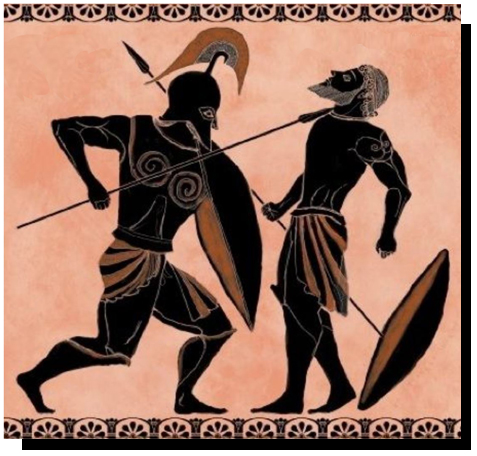Existentialism
Existentialism was largely a European philosophy that was a reaction against the Enlightenment. It blossomed in the first half of the 20th-century and by the activist 1960’s the movement largely became passe. It highly likely that existentialism would not have arisen before the industrial revolution. The critical themes of rural man experiencing the inchoate days in an urban, industrial and technological society are familiar: de-humanization, alienation (theme of Marx) and meaninglessness. A world of face without value; existence without essence; the rise of an arrogant scientism. The late professor of philosophy Dr. Arthur Holmes offers a candid explanation: “The approach of the existentialist is not going to be offering you a theory. Existentialism is not a theoretical position – a theory or a set of doctrines. You don't offer a theory to resolve existential anxiety any more than you wash your face with a hammer – it’s the wrong tool…Existentialism is not primarily a school of thought. It is more a focus of attention - of concern of human existence. Not on the essence of human nature - that would be essentialism. The existentialist is not trying to refute an opponent by appeal to some universal norms of reason. He's not trying to define the universal essence of human nature - as in the Aristotelian or Thomistic tradition. What he's doing is describing and illuminating the mess in which we find ourselves. Trying to uncover what we dread.” Two key varieties of existentialism: Kierkegaard was a self-declared Christian, while others maintained a staunch atheism outlook. Kierkegaard’s ‘theistic existentialist’ outlook denied any sort of teleology and refuted the notion that God made the universe or humans with any particular purpose in mind. To complicate matters, several leading writers changed some of their declarations in the course of their lives, making it difficult to flag which part of their work was the true and proper voice of the ‘Existentialist’. Given the profound doctrinal differences between the two varieties, a general understanding of existentialism, a sort of “Venn overlap’, sees it as an approach to 1) establish the authenticity of the individual and 2) reject certain systematic philosophies rather than as a systematic philosophy itself. If the world is going to have any lasting fundamental values – like a balance of order and chaos – for those who say, ‘we are going to have to put it there ourselves’ the critical political question becomes who exactly is the “we”? A collective with ‘noble’ intensions however lacking accountability when policies go horribly wrong or the individual whose ethics are rooted in accountability and responsibility and even prudence and common sense? (in reality, it becomes a compromise, not without controversy). Existence &
Essence The central claim of existentialism is that existence precedes essence – the opposite of the Essence stance. That the actual life of the individual is what constitutes his or her ‘essence’ instead of there being a predetermined essence that defines what it is to be a human. The human being creates its own values and determines a meaning to it life. The existentialist believes that there is no independently existing order or structure on which one could rely on for ultimate purposes or guidance. To most Existentialists the universe is a looming unknown and the experience of nothingness is an inescapable characteristic of human existence. For Existentialists there is nothing outside oneself on which one could rely for guidance or meaning, even if an explanation or construct came from religion or science. Wasteland
‘Existence & Essence’ took a dark turn after World War II. After the end of Nazi Occupation in France (DEC44) national self-auditing took place on several fronts: the unquestioned foundations of society and morality; the integrity and betrayal in relation to the Occupation; the Resistance and the Vichy Government. New horrors changed the political landscape: German death camps, large-scale strategic bombing of civilian territories, super-efficient ‘city-killer’ atomic bombs. New levels of human capacity for evil and destruction forced philosophical and moral questions beyond mere academic interest. Having witness the horrid conditions of the war it is quite the test for the soul to ‘Learn to be Positive in a Negative World’. The meaning of existence becomes much harder where it appears that the world order has no cosmic justice, no fairness, no order, no rules. The enlightenment vision is gone for many who must live, in that ‘actual life’, in a broken world of disillusionment and despair. For them Romanticism is gone. Existentialism has become ‘Romanticism turned sour’. Sing of Wrath Sign, O Goddess!
Achilles is an archetype, the heroic ideal of a man succeeding by his own abilities. He is our first existentialist hero who questioned his role in the world and the meaning of his life and the meaning of war. Acute concern for honor is characteristic of heroic legend where honor was the important motive for achievement – for bravery in warfare, but also for skill in speaking (the public assembly is, for Homer, ‘where men get honor’), and for skill in any kind of craft, even the humble arts of domestic service. The Greek City-State needed the work of every man and women, and it praised or blamed each one according to the quality of his work. The slacker could not escape censure nor the incompetent. To existentialists, human beings - through their consciousness - create their own values and determine a meaning for their life because the human being does not possess any inherent identity or value. That identity or value must be created by the individual. By posing the acts that constitute them, they make their existence more significant. Catcher in the Rye
The unique exception to the Existentialist mindset is that any authentic existence has to start with the recognition of nothingness and meaningless. A meaningless that led some to conclude, as Albert Camus claimed in The Myth of Sisyphus, “there is only one truly serious philosophical problem, and that is suicide". It has been said that the possibility of suicide makes all humans existentialists. The negative feelings arising from the ‘toxic’ mix of freedom, responsibility, nothingness and meaningless has led many to existential dread or otherwise commonly known as existential ‘Angst’. When confronted by selling a non-rational philosophy, Sartre viewed rationality as a form of ‘bad faith’, an attempt by the self to impose structure on a world of phenomena — "the Other" — that is fundamentally irrational and random. According to Sartre, rationality and other forms of bad faith hinder people from finding meaning in freedom. To try to suppress their feelings of anxiety and dread, people confine themselves within everyday experience. In a similar vein, Camus believed that society and religion falsely teach humans that "the Other" has order and structure. For Camus, when an individual's consciousness, longing for order, collides with the Other's lack of order, a third element is born: absurdity. The notion of the Absurd contains the idea that there is no meaning to be found in the world beyond what meaning we give to it. This meaninglessness also encompasses the amorality or ’unfairness’ of the world. This contrasts with ‘karmic’ ways of thinking in which ‘bad things don't happen to good people’; to the world, metaphorically speaking, there is no such thing as a good person or a bad thing; what happens happens, and it may just as well happen to a ‘good’ person as to a ‘bad’ person. Criticism In ‘Liberal Fascism’, Johah Goldberg comments, “No top-tier American conservative intellectual was a devotee of Nietzsche or a serious admirer of Heidegger. All major conservative schools of thought trace themselves back to the champions of the Enlightenment - Locke, Smith, Montesquieu, Burke - and none of them have any direct intellectual link to Nazism or Nietzsche, to existentialism, nihilism, or even, for the most part, Pragmatism”. In a ‘Brief History of Everything’ (2000), integral philosopher Ken Wilber gives his insightful interpretation of the Existentialist’s worldview: The Centaur is an existential level (Level F-6). The highest stage most conventional researchers tend to recognize. The observing self begins to transcend the mind and the body. It no longer has blind faith in the conventional roles and rules of society. You are no longer egocentric or ethnocentric. The pathology, however, is that the Centaur doesn’t privilege any perspective—it is aperspectival. Risk in getting lost because all perspectives start to become relative and interdependent; nothing absolutely foundational. Because existentialists recognize no sphere of consciousness higher than this, they are stuck with the existential worldview. If you claim there are any modes of awareness that go beyond existential angst, then you must be lapsing into death-denial, immortality projects, inauthenticity, bad faith. Any claim of a higher horizon is met with the heinous charge of “inauthentic!” The concern of meaning, and with its pervasive lack, is the central feature of F-6 pathologies: what good is the personal anyway—it’s just going to die. This is a soul for whom the personal has gone totally flat. In other words, this is a soul on the brink of the transpersonal.”
|



